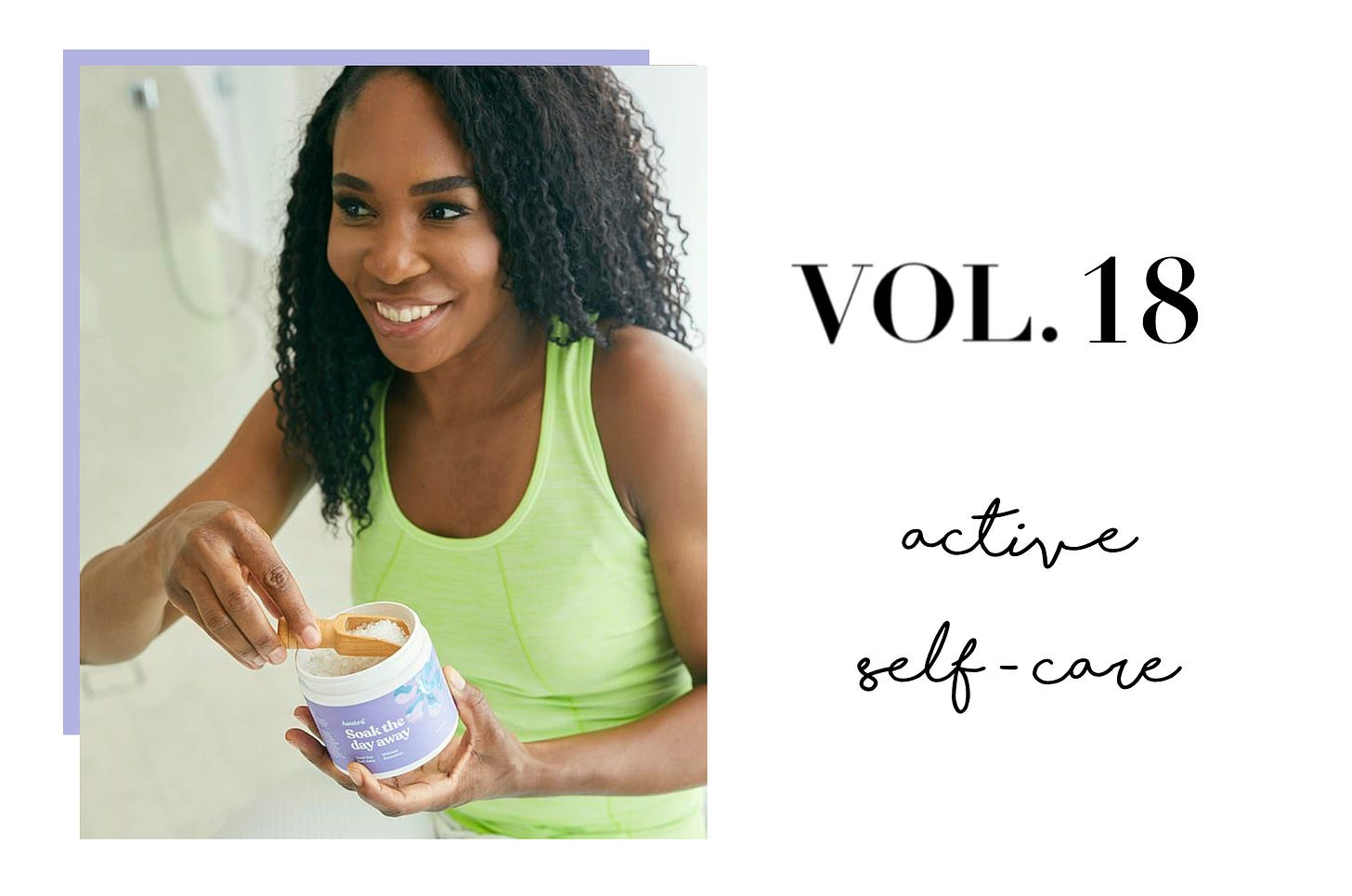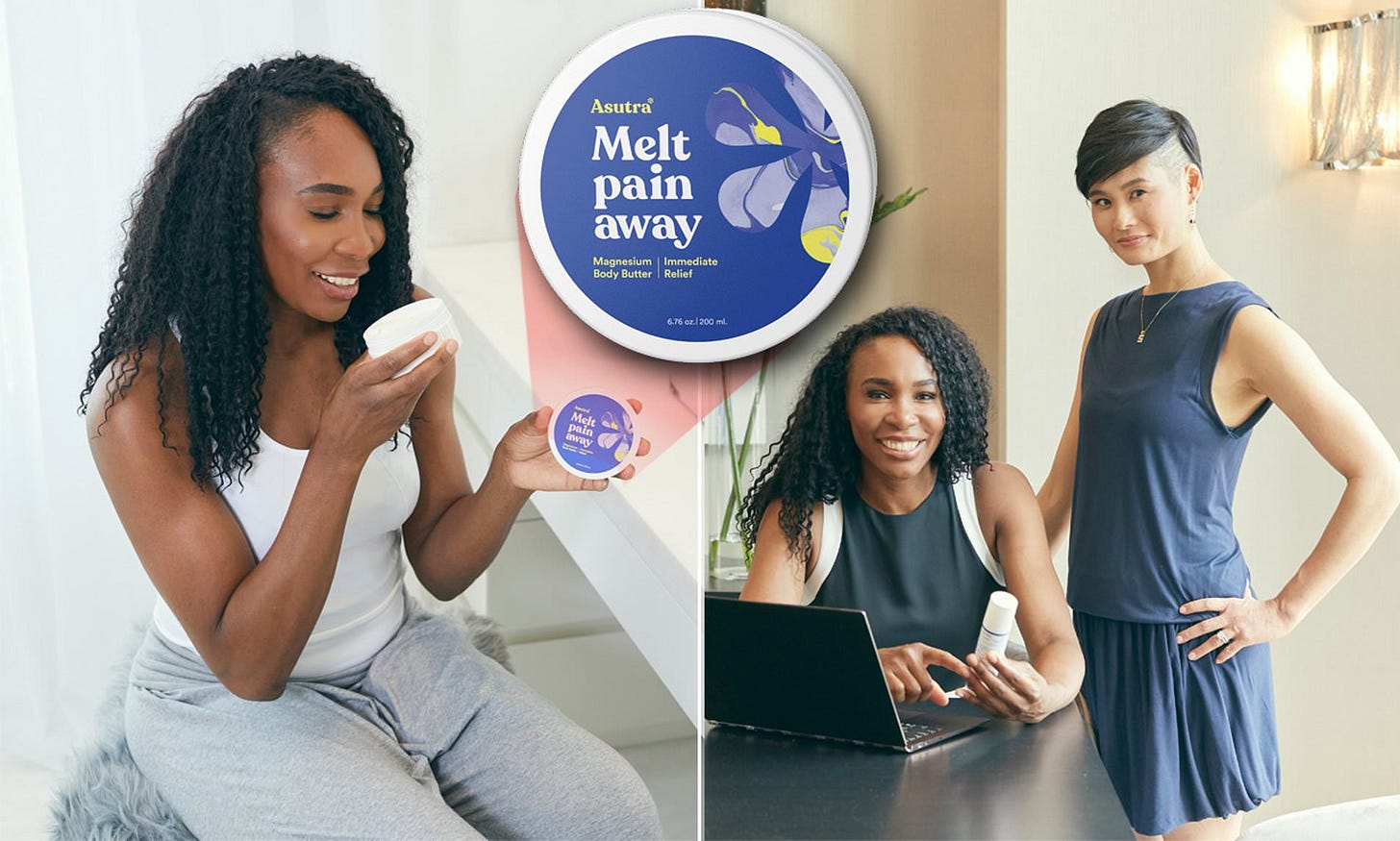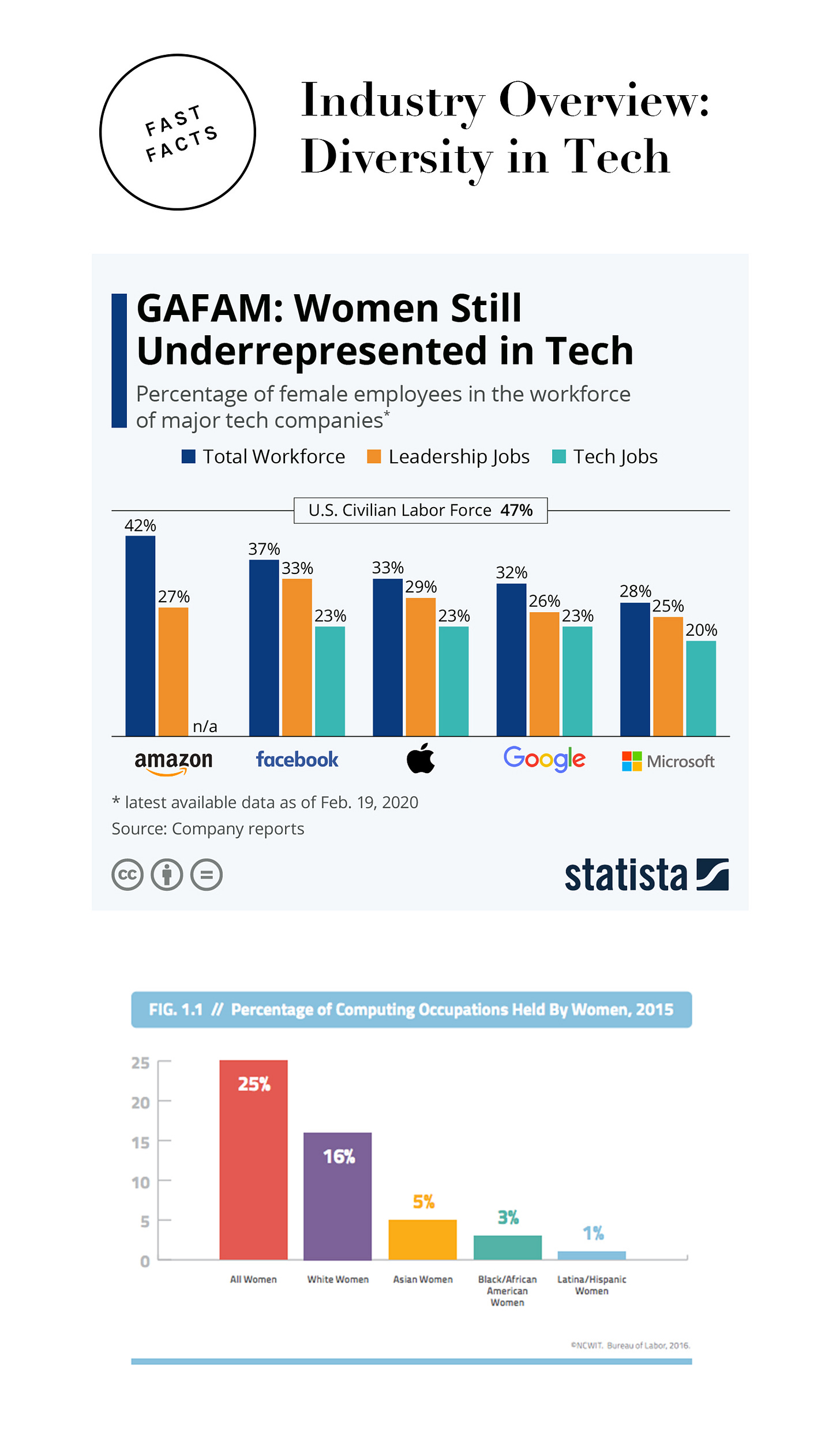Hello, CWBS!
I hope you’ve all had a restful spring break and a wonderful first week back! We’re halfway through the semester, and things are picking up on all fronts – from back-to-back midterms to interviews to projects, it can feel a little overwhelming. In this edition of the scope, I invite you to learn more about active self-care from Stephanie Morimoto, Co-Owner and CEO of Asutra, a wellness brand that champions this message. The coolest part? Asutra is co-owned by the Venus Williams (pictured above)! Read on below to get the latest on internships, opportunities, and everything women in business. Happy reading!
Best,
Sophia Naqvi, Membership Engagement Chair 2020-2021
PUBLIC: Invest in good company.
Want to give Public a try? Download the free app and start with $20 worth of stock on us.
MAKING MARKET MANIA: Market frenzies – from Crypto-currencies, to art-investing and auctions, to trading collectibles – are all connected, and have gripped the financial world and sector. Learn more.
DIVERSITY DEBUTANTS: In light of the 2020 Black Lives Matter movement across the United States and world, institutional change to address diversity has resounded; more than 60 companies have appointed their first ever diversity chair. However, experts assert that it will take more than the addition of one figure to create true positive change. Learn more.
ETHICS, ELECTRONICS, & ELON: Ethics and technology isn’t a new debate, but in 2021, it’s become the primary focus of one industry: batteries, sustainable technology, and electric vehicles. Learn more.
STEPHANIE MORIMOTO OF ASUTRA
“As the CEO, your job is to set the vision, strategy, and culture of your company.”
- STEPHANIE MORIMOTO
Stephanie is Owner & CEO of Asutra, where we're passionate about helping people take care of themselves on purpose so they can get the most out of life – what we call active self care. Asutra offers over 50 organic, natural products – from natural solutions to help with pain relief and sleep to skincare to bath & body – so you can care for yourself the way you want.
At Asutra, we’re proud to provide good jobs with career pathways at a living wage with benefits. Asutra is woman-owned and women-led; 73% of our team are people of color; and 100% of our staff would recommend Asutra as a great place to work.
Stephanie is an enthusiastic board member of Equality Illinois, which advocates for LGBTQ rights; and Naturally Chicago, which creates an ecosystem for natural products companies to thrive. In her spare time, she’s an avid urban gardener who grows everything from tomatoes to lilacs.
Your journey with Asutra is somewhat unique – you started as an avid Asutra fan and are now CEO and owner! What inspired you to acquire the brand? When you became owner and CEO, how did you plan to grow and transform Asutra?
I started as a user; I was using the organic Yoga Mat Cleaning sprays and found out there were other products that I fell in love with. When I purchased Asutra, I was interested in making a career switch from education back to my entrepreneurial roots.
I have a friend who had similarly acquired a company, and they had a really good time transforming the brand – I decided I wanted to do the same thing! I found a small business lawyer who got a lot of different leads. He said, “Hey, I just got this memo that this health and wellness company is for sale. You might be interested.” I took a look and I realized that I had the products in my house – it was Asutra! – and I thought, “OK, this might be destiny.”
When I acquired Asutra, it already had a catalog of really great products and thousands of passionate customer reviews, but there wasn't really a brand or a story around it. We did a lot of market research with customers who loved the idea of a go-to brand that could help them with their self-care. We came up with our slogan or motto, “Active self-care.” We want to help you take care of yourself – on purpose – so you can take on anything.
Asutra prides itself on being women-owned and women-led. What challenges or opportunities have you experienced as a woman CEO and owner of a company?
I'll start with the opportunities; our mission is active self-care, and I think women, in particular, are often trained to take care of other people before they take care of themselves. We’re really out to change that, to spread the idea that if you want to be your best as a woman leader, as a mother, as a sister, as a daughter, as a friend, then you need to take care of yourself first.
With that mission, it's much easier to be women-led and women-owned because we understand that experience. Whether it's recovering after a workout or balancing work and homeschooling kids during COVID-19, we have multiple perspectives on how to incorporate self-care into our daily lives. Moreover, there’s a lot of research that shows that women are trained in both their professional and personal lives to be very collaborative and inclusive; I like to think that we really focus on that and create that type of culture here at Asutra.
In terms of challenges, it can be very challenging to be a woman in the business world, whether it's fighting for equal pay for employees to having our voices heard in the same space. But I think we've been very fortunate in that one of our owners is global tennis icon, Venus Williams. Even though she's a woman, she has an incredible international platform and a following, and she can really be a megaphone that amplifies our message and our mission.
What is it like working with CBO and part owner Venus Williams? How have her insights contributed to the brand?
Venus is just an incredible person. She's been on the global stage since she was 16 years old, playing professional tennis for twenty-four years and also being an advocate for equal pay between women tennis players and men tennis players. She’s been an incredible athlete, activist and role model for so many people in and outside of sport. That alone is incredible.
She is a winner – she works really hard, doesn't give up, and she takes that attitude both on and off the court. She herself is an entrepreneur too; she runs two businesses: one is EleVen by Venus, an athletic apparel company, and the other is the V Starr Interiors, an interior design company – clearly, she has a love of design! She is a natural products and skincare geek, as she will tell you. She not only provides insights as a business owner, but also as a user of different products. She asks questions like “What are the ingredients? What are the formulations? What are the types of products we can offer to our customers?”
What skills are vital to running a successful business, particularly in the wellness industry?
1/Set a Vision, Strategy, and Culture: I think overall, whether it's wellness or a different industry, as the CEO, your job is to set the vision, strategy, and culture of your company. Where do you want to go? How are we going to get there? How are we going to treat each other and work together as we get there? I think that's really critical for us on the culture front.
I talk a lot about core values, so we set certain value statements and define those. Those are how we hire people. Those are in part how we evaluate our staff and they really form the basis of how we work together and how we treat each other. So one of our core values, for instance, is “one team, one goal.” We are a small but mighty team, so we all pitch in when we need to, to get the job done and we have each other's backs.
2/Be Consumer-Focused: In the wellness industry, in particular, and especially with the global pandemic, it's important to always be thinking about what functional benefits you're providing to your customers. We ask questions like: “what are the ingredients you can include that really help people with relaxing, relieving stress, getting a better night's sleep, and relieving pain?” When people find a solution that works, then they stick with it.
3/Cultivate Diversity: The third skill is just building a really great team as the leader of, again, any type of company, but especially in wellness; building a diverse team that brings a lot of different perspectives has been a real benefit for us.
What advice do you have for college students, particularly those interested in entrepreneurship, business, and wellness?
1/Build Your Network: Be intentional about building a network. Part of what has helped me succeed in a variety of endeavors is that I, for 22 years, since graduating from college and even while in college, have intentionally built and kept up with a network of people who have very different experiences and expertise. When I have a specific problem that I need help solving, I have a variety of people I can call for specific help. Those in my network are often very generous, not only with their time and expertise but also in connecting me to other people in their networks who can help me further.
2/Get Experience: The second thing is to get as much hands-on experience as you can. First, I think you have to learn if you really want to be an entrepreneur; you could be doing anything from coming up with new products and figuring out a marketing strategy one day, to the next day, packing boxes and running to the post office. Ask yourself: do you like being scrappy? Do you like doing all those different things? The way to understand that is to experience it. So volunteer if you can afford to, or look for internships at small businesses and entrepreneurial endeavors so you can see what it's really like.
What advice do you have about networking? How did you do it in college? How do you maintain those relationships now?
At a lot of colleges the people who are your friends or your peers can one day become very helpful members of your network; maintaining those friendships or relationships with peers that you develop is really key.
I also intentionally formed relationships with different people at each job I had after college, whether they were a manager or, again, a peer. To this day there's a woman I worked for three years out of college who ran the organization where we helped women of color start small businesses – we're still in touch. She’s really tapped into the small business and entrepreneurial space in the United States, which has a lot of benefits.
Even if it's something simple – for example, you end up in different cities, so it's harder to keep in touch in person. Maybe you send them a happy birthday note every year or you stay connected on LinkedIn. Just staying in each other's lives in some way is a great way to maintain a network.
Quick Takes:
What are three of your favorite Asutra products?
It's like picking your favorite kids!
1/Relieve Your Pain: I love this new product that we launched just last summer called “Relieve Your Pain.” It's a menthol magnesium lotion and it has a cooling sensation. So I work out a lot and I have tight muscles after a workout or after sitting at my computer all day; I just love massaging it in; it's very relieving and soothing. The magnesium is really good for you as well!
2/Soak the Day Away: I also love taking baths, so I love our Dead Sea salt bath salts. They're called “Soak the Day Away” and there is one called muscle and joint, which is peppermint. It's both relaxing on your muscles, but also a little invigorating, which I love. And then I love our face oils, too.
3/Face Oils: We have a “refresh face oil” and “restore face oil,” and they're really great organic face oil formulations that are pretty affordable but great for either oily or dry skin.
Recommend a few books, podcasts, websites, or blogs you would recommend to CWBS readers.
1/Now, Discover Your Strengths by Donald Clifton and Marcus Buckingham (Book)
2/How I Built This by Guy Raz (Podcast)
3/The Unofficial Shopify Podcast by Kurt Elster (Podcast)
What’s one act of active self-care that you practice everyday?
Sleep: I do a lot of active self-care! I would say the most important one is sleep. If you sleep enough, you're a better leader, you're more patient, you can move better – whatever it is, sleep will help you with it.
Internships/Professional Opportunities
Financial Services
Consulting
Tech
Startups
Venture Capital/Private Equity
In the U.S., 8 out of 10 tech industry employees claim they are satisfied with their company’s diversity efforts and 87% have worked in a diverse team in the last year. At the same time, data from the U.S. Equal Employment Opportunity Commission indicate that the tech workforce, especially in tech-specific jobs, remains overwhelmingly white, male, and straight.
Tech firms struggle with the retention of workers from underrepresented communities. In the U.S., women working in tech leave their jobs at a 45% higher rate than men do, often due to corporate culture issues, lack of inclusion, and pay inequity.
Companies in Silicon Valley continue to lag behind. People of color comprise only 5% of Silicon Valley’s workforce while startups are still largely led by white executives, with only 1.4% of executives identifying as BIPOC. For most VC firms, investing in diverse entrepreneurs and hiring BIPOC, women, or people living with disabilities is not a top priority.
According to the U.S. Department of Labor, in March, 60% of those laid off due to the pandemic were women, with Black and Latinx women subjected to job loss at a higher rate. The challenges women are facing now are not new: lack of funding and support has been hindering the success of female entrepreneurs for decades. Women founders acquire only 2% of venture capital dollars, and the number is even lower for BIWOC.
The road through tech remains challenging for the LGBTQ+ community. Industry giants, including Google and Amazon, were accused of condoning discrimination against their LGBTQ+ employees. To make the future of tech more inclusive, firms are implementing exciting projects: for instance, Intuit partnered with the GenderCool Project, an organization that educates about trans and non-binary identities, to create a new mentorship program aimed at transgender youth.
Diversity is the key to success! In its corporate ranking that examined diversity and inclusion in business, The Wall Street Journal concluded that diverse groups, both in terms of identity and career, are more innovative and productive than homogeneous groups. To catch up with other industries, tech companies have allocated much effort into diversifying their workforces and maintaining environments where all employees feel valued. By issuing diversity reports, reforming the recruitment process, and implementing bias training, many enterprises were able to generate more diverse and successful teams.
Key tech companies committed to diversity & inclusion: Cisco, Microsoft, Facebook, Hewlett Packard, Apple, 23andMe, Amazon, IBM, Oracle
MONEYGIRLS: It’s time to run your own money.
MoneyGirls’ goal is to empower all women to maximize their independence, influence, and leadership by giving them the tools and resources necessary to take control of their financial lives. MoneyGirls aims to carry out this mission through the Monday MoneyDrop, a once-a-week newsletter, the MoneyBag, and the MoneyGirls Strategist Network. Get involved here.
HILMA: Upgrade your medicine cabinet. Natural remedies, formulated without doctors. Use code COLUMBIA for 10% off.
EAT BEHAVE: Low-sugar candy that actually tastes like candy. Use code COLUMBIAU for free shipping.
RYLA WELLNESS: Welcome to Ryla! Our plant-based wellness blends help your immune system do its job, keeping you doing whatever you want. Each of our dried shots contain real organic superfoods and 500mg of Vitamin C. Get 15% off with code CWBS15.
PLANT PRESS: For 15% off Plant Press’ CBD-Based drinks, use code COLUMBIA at checkout.
PARADE: For Seamless, smooth, and comfortable underwear. In colors for every day of the week. Just $9. All in sizes from XS to 3X. Get a free pair here.



















